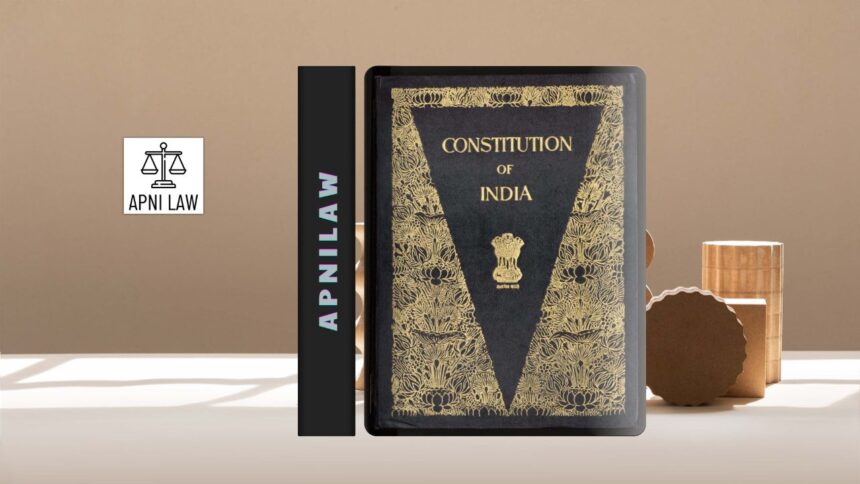The Constitution of India provides three types of emergencies, national, state, and financial. Among these, Article 360, which deals with the Financial Emergency, is the least discussed and the most extraordinary. It empowers the President of India to step in when the nation’s financial stability or credit is in grave danger. While this provision exists as a safeguard, it has never been invoked in India’s history, reflecting both its extremity and the caution with which it is approached.
What Is a Financial Emergency Under Article 360?
Article 360 allows the President to declare a Financial Emergency if the financial stability or credit of India, or any part of its territory, is threatened. Unlike other emergencies, which focus on war, aggression, or breakdown of governance, a Financial Emergency specifically addresses economic collapse or fiscal instability.
This provision shifts the balance of power between the Centre and the states. During such an emergency, the Union government gains direct control over state finances and can dictate fiscal policies. The purpose is to prevent a complete breakdown of the economy and ensure unified national response.
How Is a Financial Emergency Declared?
The process of declaring a Financial Emergency begins with the President’s satisfaction that India’s financial stability is under threat. The grounds can be domestic, such as severe inflation, debt crisis, or collapse of revenue systems, or external, such as global financial shocks or balance of payments crises.
Once the President issues a proclamation, it must receive approval from both Houses of Parliament within two months. If one House is dissolved during this period, the proclamation continues until thirty days after its reconstitution, giving sufficient time for review.
Unlike a National Emergency under Article 352, which has a fixed duration and requires renewal, a Financial Emergency continues indefinitely once approved. It lasts until the President revokes it, making it potentially permanent unless reviewed. This feature makes Article 360 unique and also more controversial.
What Happens During a Financial Emergency?
The effects of a Financial Emergency are sweeping. The Union government acquires extraordinary powers to direct states on financial matters. State autonomy in fiscal policy is temporarily suspended.
The President can order states to follow specific economic and budgetary policies. Salaries and allowances of government employees, including judges of the Supreme Court and High Courts, may be reduced. This feature has often raised concerns about judicial independence during such emergencies.
Money bills or financial bills passed by state legislatures can be reserved for the President’s consideration. Expenditure approvals, fiscal planning, and financial administration become centralized. Essentially, the principles of fiscal federalism are set aside, and both legislative and executive powers related to finance rest with the Union.
Why Was Judicial Review Important?
Originally, the 38th Amendment of 1975 made the President’s satisfaction in declaring an emergency final and beyond judicial review. This meant courts could not question the grounds or necessity of a Financial Emergency.
However, the 44th Amendment of 1978 reversed this change. Judicial review was restored, empowering courts to examine whether a proclamation was justified. This safeguard ensures that the President’s decision is not arbitrary and that misuse of Article 360 can be challenged.
This amendment was significant because it came after the Emergency of 1975–77, when extraordinary powers at the Centre raised deep concerns about democracy. By restoring judicial oversight, the 44th Amendment balanced emergency powers with constitutional accountability.
Why Has Article 360 Never Been Invoked?
Despite serious financial challenges, India has never witnessed a Financial Emergency. The most cited example is the 1991 Balance of Payments crisis, when India had only enough foreign exchange reserves to cover two weeks of imports. Instead of invoking Article 360, the government chose structural reforms, liberalization policies, and loans from international institutions like the IMF.
This avoidance shows that governments prefer policy reforms, external borrowing, or fiscal adjustments over the drastic step of declaring a Financial Emergency. The stigma associated with central overreach, along with fear of political backlash, has kept this provision unused.
Even during the global financial crisis of 2008, or the economic disruption caused by the COVID-19 pandemic in 2020, India did not resort to Article 360. Instead, fiscal stimulus packages, monetary easing, and policy adjustments were employed.
What Risks Does Article 360 Carry?
The powers under Article 360 are extraordinary and sweeping. They raise several risks.
First, it gives the Centre near-total control over state finances. This undermines the federal structure, which is a cornerstone of the Indian Constitution. States lose the power to design their budgets, implement welfare schemes, or allocate resources independently.
Second, it can affect judicial independence. Since the President can order reductions in the salaries of judges, critics argue this could compromise the judiciary’s ability to act as a check on misuse.
Third, it may centralize decision-making to such an extent that it weakens democratic accountability. Elected state governments become powerless in fiscal matters, reducing their role to implementing Union directives.
These risks explain why Article 360 is considered a measure of last resort and why governments have consistently avoided invoking it, even during crises.
What Safeguards Exist to Prevent Misuse?
Several constitutional safeguards exist to balance the extraordinary nature of Article 360. Parliamentary approval is essential within two months of the proclamation. Both Houses debate and review the grounds for the emergency, preventing unilateral action by the executive.
Judicial review, restored by the 44th Amendment, is another safeguard. Courts can strike down a proclamation if it is based on irrelevant or mala fide reasons. This ensures accountability of the executive to constitutional principles.
Political costs also act as a safeguard. Declaring a Financial Emergency would attract criticism from opposition parties, states, civil society, and the media. The government may face long-term political consequences for imposing central control, which discourages arbitrary use.
How Do Experts View Article 360?
Legal scholars and policy experts often describe Article 360 as a “nuclear option” in the Constitution. While it provides a constitutional framework to handle economic collapse, it carries dangers of misuse.
Many recommend clearer criteria for triggering a Financial Emergency. At present, the phrase “financial stability or credit” is too vague, allowing wide discretion. Experts also advocate greater parliamentary scrutiny, such as periodic review or renewal similar to National Emergency provisions, to prevent indefinite continuation.
Some suggest limiting the scope of the article. Instead of giving the Centre blanket control, the powers could be tailored to specific fiscal areas, preserving some degree of state autonomy. Such reforms would make Article 360 more precise and less prone to abuse.
Could India Ever See a Financial Emergency?
While India has avoided invoking Article 360 so far, the possibility cannot be ruled out entirely. Severe global recessions, catastrophic natural disasters, or prolonged wars could destabilize the economy to such an extent that normal policy measures may fail.
However, India’s growing economic resilience, diversified economy, and stronger institutions make such a scenario less likely. The experience of past crises shows that governments prefer fiscal reforms and international cooperation over constitutional emergency measures.
Still, Article 360 remains a reminder of the Constitution’s foresight. It acknowledges that extraordinary times may demand extraordinary powers, but it also warns of the dangers of central overreach.
For any specific query call at +91 – 8569843472
Conclusion
Article 360 of the Indian Constitution is a powerful but dangerous tool. It empowers the President to restore financial stability in times of grave economic threat, but it centralizes power at the cost of federalism and judicial independence.
Its history of non-use demonstrates India’s preference for democratic and policy-based solutions over constitutional emergencies. Safeguards like parliamentary approval and judicial review ensure that if ever invoked, Article 360 would face strict scrutiny.
Ultimately, the provision represents a balance between caution and preparedness. It exists to protect the nation in extraordinary crises but should remain a last resort, used only when all other measures fail. India’s constitutional spirit demands that even in the worst financial storms, democracy and federalism must remain intact.








